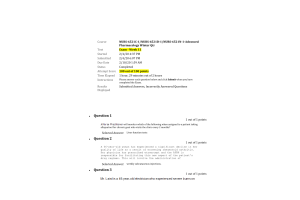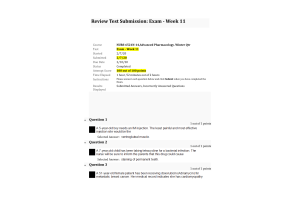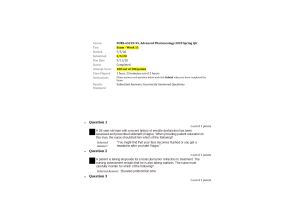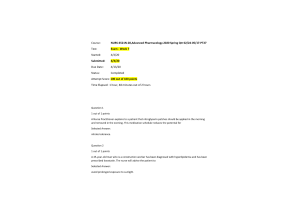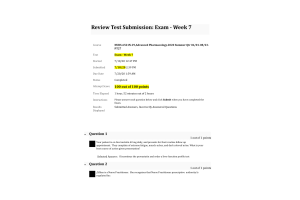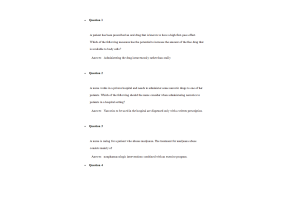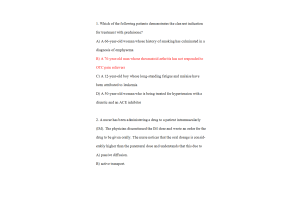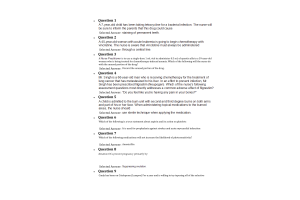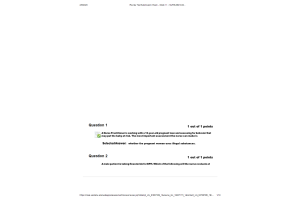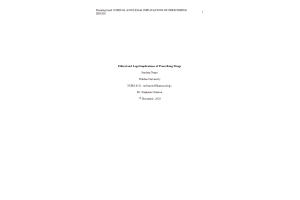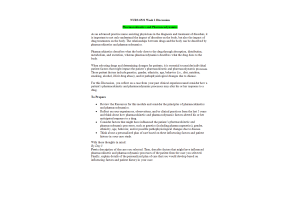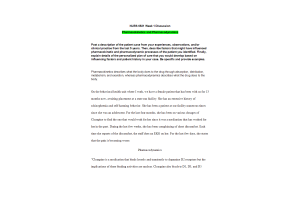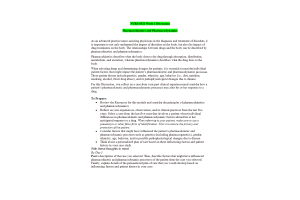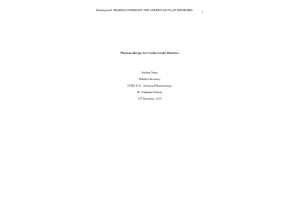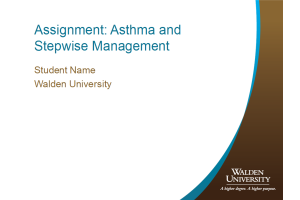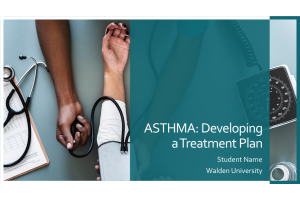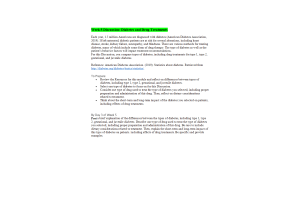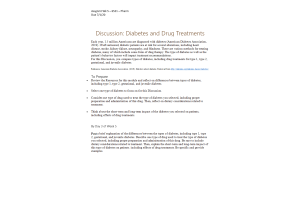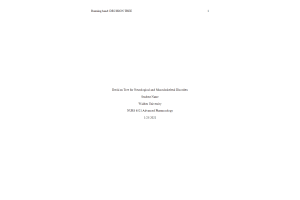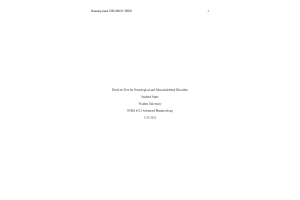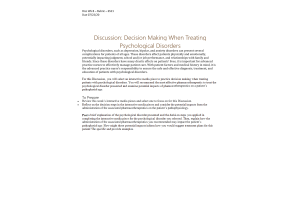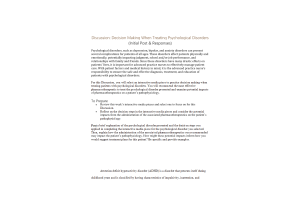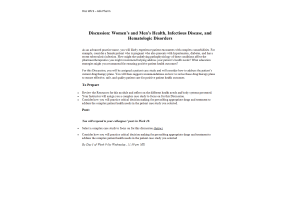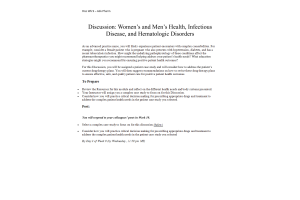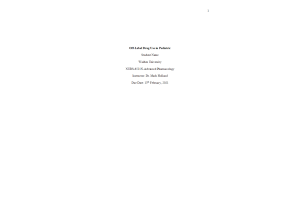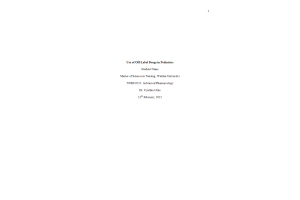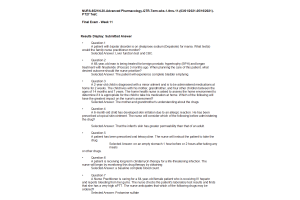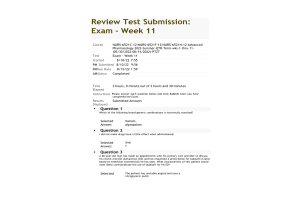NURS 6521F-6 Week 11 Final Exam
- $65.00
1. Question: A Nurse Practitioner is assigned to a patient who is at 32 weeks' gestation and is receiving terbutaline (Brethine) IV for 24 hours to control preterm labor. Which of the following nursing actions will the nurse take to decrease the risk of hypotension and promote circulation to the fetus?
2. Question: A 71-year-old man has just been prescribed finasteride (Proscar). Which of the following complaints by this patient most likely indicated a need for this drug?
3. Question: Jacob was eating cheese and drinking beer. Thirty minutes Later, he developed severe hypertension, diaphoresis, Flushing, and muscle rigidity. He may have been taken which drug?
4. Question: A Nurse Practitioner is working with a 16-year-old pregnant teen and assessing for behavior that may put the baby at risk. The most important assessment the nurse can make is:
5. Question: Drugs have a valid medical use but a high potential for abuse, both psychological and physiologic. In an emergency, a Schedule 2 drug may be prescribed by telephone if a written prescription cannot be provided at the time. However, a written prescription must be provided within 72 hours with the words authorization for emergency dispensing written on the prescription. These prescriptions cannot be refilled. A new prescription must be written each time. Examples include certain amphetamines and barbiturates. This is scheduled drug:
6. Question: A 15-year-old boy who has been taking extroamphetamine for the treatment of ADHD has been experiencing a depressed mood and a sense of hopelessness. He confides in the school nurse that he has begun taking his stepfather's antidepressant to improve his mood. After immediately phoning the boy's stepfather, the nurse learns that the drug in question is phenelzine (Nardil), a monoamine oxidase inhibitor (MAOI). The nurse should recognize that this combination of drugs creates a serious risk of what health problem?
7. Question: When a NP chooses a benzodiazepine to treat anxiety the prescriber needs to be aware of the possibility of dependence. The Benzodiazepine associated with the greatest likelihood of causing rapid dependence is:
8. Question: A 46-year-old man is receiving a quinupristin/dalfopristin IV infusion for a life-threatening infection. Which of the following would be most important for the nurse to monitor?
9. Question: A nurse practitioner orders a single dose of 2 g Metronidazole orally. How many milligrams will the patient receive in one dose?
10. Question: A 51-year-old female patient has been receiving doxorubicin (Adriamycin) for metastatic breast cancer. Her medical record indicates she has cardiomyopathy and a cumulative dose of 300 mg/m2 of doxorubicin. Which of the following measures would help limit the severity of the cardiomyopathy in this patient?
11. Question: A patient who is at risk for DVT tells the NP she has just learned she is pregnant. The NP should expect that this patient will use which of the following anticoagulant medications?
12. Question: A 38-year-old pregnant patient admits to the Nurse Practitioner that she is an alcoholic and has been consuming alcohol during her pregnancy. The nurse knows that using alcohol during pregnancy may result in a child who presents with:
13. Question: A 67-year-old man who is being treated for prostate cancer is taking epoetin alfa. The nurse will instruct the patient to:
14. Question: A 45-year-old female patient is prescribed ciprofloxacin to treat a bronchial infection. A nursing assessment revealed that she started taking daily vitamin supplements about 2 years ago. To maximize the therapeutic effects of the ciprofloxacin therapy, the nurse should advise the patient to:
15. Question: A 34-year-old male has been diagnosed with TB and will be started on INH therapy. The medication history reveals that he currently takes antacids on a regular basis. The nurse will instruct the patient to take
16. Question: The clinical nurse educator who oversees the emergency department in a children's hospital has launched an awareness program aimed at reducing drug errors. What measure addresses the most common cause of incorrect doses in the care of infants and children?
17. Question: Which antibiotic is most frequently associated with "Red man Syndrome"
18. Question: A 72-year-old patient is prescribed ophthalmic ciprofloxacin for a bacterial infection in her right eye. The nurse will teach her to observe for which of the following adverse effects of the drug?
19. Question: A patient with non-Hodgkin's lymphoma (NHL) will be starting a course of doxorubicin shortly. When planning this patient's care, what nursing diagnosis should the nurse prioritize?
20. Question: A Nurse Practitioner is explaining to a pregnant 21-year-old college student why she cannot continue to take ibuprofen (Advil) for her headaches. The nurse draws a picture depicting drug molecules crossing the placental membrane and entering into the fetal circulation. The nurse tells the patient that the main reason this happens is because:
21. Question: A 39-year-old woman is receiving doxorubicin for the treatment of cancer. After each treatment, the patient has acute nausea and vomiting accompanied by a slightly increased heart rate. The nurse will advise her to:
22. Question: Which of the following drugs is most likely to cause sexual dysfunction and males?
23. Question: A patient has been taking doxazosin(Cardura) 2mg PO daily for 3 weeks for treatment of BPH. He returns to the clinic and is complaining feeling dizzy when he stands up. Which action would the family nurse practitioner take?
24. Question: A Nurse Practitioner is caring for a patient who is on amphotericin B. On morning rounds the patient reports weakness, numbness, and a tingling sensation in his feet. What would be a priority action by the nurse?
25. Question: The NP recognizes that these medications are useful when taken during early symptoms of a migraine. (Select all that apply)
26. Question: A 13-year-old female took a weight loss drug that activated the sympathetic nervous system. Which of the following assessment findings would the nurse expect?
27. Question: A Nurse Practitioner is discussing with a 58-year-old male patient the causes of erectile dysfunction in men over 50 years of age. Which of the following will the nurse inform the patient is the primary physical cause of erectile dysfunction of men in this age group?
28. Question: A Nurse Practitioner will instruct a patient taking allopurinol to take each dose:
29. Question: A 66-year-old woman has experienced a significant decline in her quality of life as a result of worsening rheumatoid arthritis. Her physicianhas prescribed etanercept and the APRN is responsible for facilitating this new aspect of the patient's drug regimen. This will involve the administration of
30. Question: Which of the following medication classes should be avoided and men with BPH
31. Question: The maximum amount of acetaminophen that can be taken per day is
32. Question: Laboratory testing has confirmed that a patient has chloroquine-resistant malaria and the patient's physician has prescribed quinine along with an adjunctive drug. The nurse should question the physician's order if the patient has a history of
33. Question: A male patient is experiencing climacteric symptoms secondary to androgen deficiency. His physician has prescribed testosterone. The nursing assessment reveals that the patient has had a myocardial infarction. The combination of testosterone therapy and a history of myocardial infarction would place that patient at a significantly higher risk of
34. Question: A Nurse Practitioner is caring for a 10-year-old boy who complains of chronic headaches. His mother reports that she gives him Tylenol at least three times a day. Which of the following will the nurse work with the physician to evaluate?
35. Question: A patient is prescribed ganciclovir to treat a CMV infection. An oral dosage is prescribed. To help increase bioavailability of the drug,the nurse will encourage the patient to take the medication
36. Question: A 20-year-old woman will soon begin taking oral contraceptives for the first time. What advice should the nurse provide to this patient?
37. Question: Steady state is:
38. Question: Mr. Singh is a 66-year-old man who is receiving chemotherapy for the treatment of lung cancer that has metastasized to his liver. In an effort to prevent infection, Mr. Singh has been prescribed filgrastim (Neupogen). Which of the nurse's following assessment questions most directly addresses a common adverse effect of filgrastim?
39. Question: A pregnant patient asks the Nurse Practitioner what over-the-counter medication she can take for recurring headaches. The nurse should recommend
40. Question: What is the best initial treatment plan for a sleep disorder in the older adult patient?
41. Question: What schedule class of drug is Hydrocodone?
42. Question: A male patient is receiving heparin by continuous intravenous infusion. The nurse will instruct the patient and family members to report which of the following should it occur?
43. Question: A pregnant patient who has diabetes has been admitted to the hospital to begin labor. Since the patient has diabetes, the physician has decided to use oxytocin (Pitocin) to initiate labor contractions. When talking to the patient about the adverse effects of the drug, the nurse should understand that the most common adverse effects of the drug include
44. Question: A 7-year-old child has been taking tetracycline for a bacterial infection. The nurse will be sure to inform the parents that this drug could cause
45. Question: A child with chronic allergic symptoms uses an intranasal steroid for control of symptoms. At this child's annual well-child checkup, the NP should carefully review what?
46. Question: An oncology nurse is reviewing the pathophysiology of cancer and is discussing with a colleague the factors that contribute to the success or failure of a patient's chemotherapy. Which of the following cancerous cells is most susceptible to the effects of chemotherapeutic drugs?
47. Question: A quinolone used to treat a urinary tract infection would be contraindicated in :
48. Question: The Nurse Practitioner has established peripheral IV access and begun an infusion of magnesium sulfate on a 29-year-old antepartum patient who is 35 weeks pregnant. Which of the following assessment findings most likely prompted the patient's physician to order magnesium sulfate for this patient?
49. Question: The nurse recognizes that the potential for teratogenic drug effects is not static throughout the prenatal and postnatal periods. The potential for teratogenic effects is highest during
50. Question: A patient is taking flavoxate hydrochloride (Urispas) to help control an overactive bladder. On a follow-up visit to the clinic, the nurse will question the patient about which of the following?
51. Question: A patient is taking etoposide for a testicular tumor refractory to treatment. The nursing assessment reveals that he is also taking warfarin. The nurse must carefully monitor for which of the following?
52. Question: Terazosin (Hytrin) is classified under which of the following drug class:
53. Question: An oncology nurse is aware of the risks for injury that exist around the preparation, transportation, and administration of chemotherapeutic agents. In order to reduce these risks of injury, the nurse should take which of the following actions?
54. Question: Ms. Carter, a 48 year old female was placed on an aminoglycoside. The NP knows that an adverse reaction to aminoglycosides is?
55. Question: 16-year-old boy is prescribed cromolyn sodium nasal spray to treat a nasal allergy. To maximize the therapeutic effects of the drug, which of the following will the nurse include in instructions to the patient?
56. Question: A patient is receiving long-term clindamycin therapy for a life-threatening infection. The nurse will begin by monitoring this drug therapy by obtaining
57. Question: A 54-year-old woman with a history of osteoporosis has been prescribed ciprofloxacin for recurrent cystitis. Because of the patient's history, the nurse would be sure to discuss with the woman the use of
58. Question: A 54-year-old woman with a history of osteoporosis has been prescribed ciprofloxacin for recurrent cystitis. Because of the patient's history, the nurse would be sure to discuss with the woman the use of
59 Question: An immunocompromised 7-year-old child was recently discharged home with a peripherally-inserted central line (PIC line) for home antibiotic therapy. He has now been brought to the emergency department by his mother and father with signs and symptoms of line sepsis. Upon questioning, the mother states that she has been removing the PIC dressing daily and washing the site with warm water and a cloth. What nursing diagnosis is most appropriate in this situation?
60. Question: Which of the following agents would not be expected to cause nausea, vomiting, Flushing, dizziness, headache, and abdominal discomfort after consumption of alcohol?
61. Question: A patient has been admitted to the critical care unit with a diagnosis of peritonitis that has necessitated treatment with gentamicin. As a result, the care team should be cautious when concurrently administering other medications that may cause:
62. Question: A 36-year-old patient comes to the clinic and tells the nurse practitioner that she suspects that she is pregnant. During the initial assessment, the nurse practitioner learns that the patient is currently taking medications for diabetes, hypertension, and a seizure disorder. The nurse would be most concerned about which of the following medications?
63. Question: A school nurse has been teaching high school students about the risks associated with marijuana use. However, the nurse has been met with considerable skepticism on the part of students, most of whom believe that marijuana is a benign drug. Which of the following teaching points should the nurse provide?
64. Question: The Nurse Practitioner knows that Buproprion use (wellbutrin, zyban) is contraindicated in which of the following instances?
65. Question: Gold compounds are contraindicated in patients with all of the following conditions except:
66. Question: Which of the following pharmacologic agents can be used to treat nicotine dependence/ smoking cessation?
67. Question: Tetra cyclines are contraindicated in children younger than eight years old because of?
68. Question: A patient with AIDS has developed a number of secondary infections in recent weeks, including Kaposi's sarcoma. As a result of this mostrecent diagnosis, his care team has opted to begin treatment with interferon alfa-2a. The nurse is aware that this drug will address the etiology of Kaposi sarcoma by
69. Question: A male patient is trying to decide if he should use finasteride (Proscar) to treat benign prostatic hypertrophy (BPH). When providing information about the drug, the nurse will include which of the following as a risk associated with finasteride therapy?
70. Question: A 12-year-old boy is being discharged from the hospital after major surgery. The boy will be taking two medications at home for an extended period. The nurse who is discharging the patient should provide medication teaching specifically to
71. Question: A nurse practitioner has administered filgrastim to a diverse group of patients in recent months. Which of the following patients should the nurse observe for extremely elevated white blood cell counts following administration of the drug?
72. Question: A nurse practitioner has been assigned to a 55-year-old woman who has a malignant brain tumor. The patient is receiving her first dose of carmustine. It will be critical for the nurse to observe for which of the following?
73. Question: A Nurse Practitioner is performing patient education for a woman who has just been prescribed a bisphosphonate. Which of the following diagnostic and history findings would have prompted the woman's care provider to prescribe a bisphosphonate?
74. Question: A child is taking permethrin for head lice. The Nurse Practitioner will instruct her mother to
75. Question: A 36-year-old woman with a history of dysmenorrhea has begun treatment with progesterone, which she will be receiving by the intramuscular route. The nurse participating in the woman's care should prioritize which of the following potential nursing diagnoses?
76. Question: Which antibiotic requires administration of a loading dose?
77. Question: What is the minimum inhibitory concentration (MIC)
78. Question: A patient with bipolar disorder is on divalproex sodium (Depakote) formania. What est(s) would the family nurse practitioner monitor?
79. Question: A patient has been admitted to the critical care unit of the hospital with bacterial septicemia that has failed to respond to initial antibiotic treatment. The patient's most recent blood cultures reveal the presence of methicillin-resistant Staphylococcus aureus (MRSA) in the patient's blood. The nurse will anticipate that this patient will likely require intravenous administration of what antibiotic?
80. Question: Which of the following is a true statement about aspirin and its action on platelets
81. Question: Some drugs are given to patients using other routes such as sublingual or topical to avoid movement through the liver and possible side effects. Which of the following effects is the Nurse Practitioner attempting to avoid by administering certain medications via alternative routes?
82 Question: A 35-year-old woman is on a weight-loss program and is to begin taking sibutramine (Meridia). After baseline physical data are obtained, the nurse will assess the patient's childbearing potential. The nurse will inform the patient that during sibutramine therapy she should
83. Question: A 68-year-old man is being treated for benign prostatic hypertrophy (BPH) and began treatment with finasteride (Proscar) 3 months ago. When planning the care of this patient, what desired outcome should the nurse prioritize?
84. Question: When prescribing Phosphodiesterase type 5 (PDE-5) inhibitors such as sildenafil, the patient should be screened for use of?
85. Question: All insects have an FDA black box warning regarding
86. Question: During ongoing assessment of a patient receiving 5-FU therapy, the nurse finds the
patient's platelet count to be 92,000 cells/mm3. The nurse should do which of the following?
87. Question: A patient asks the nurse practitioner about food sources such as soybeans and soy products. The nurse practitioner understands that these foods are considered
88. Question: Alprostadil (Caverject), a drug used to treat erectile dysfunction, has been prescribed to a 42-year-old patient. When providing education to the patient and his wife, the nurse should inform the wife about which of the following adverse effects?
89. Question: A Nurse Practitioner who provides care on a pediatric medicine unit has conducted a medication reconciliation of a recently-admitted patient. In light of the fact that the child takes methylphenidate (Ritalin), the nurse is justified in considering a history of what health problem?
90. Question: A 2-year-old child is diagnosed with a minor ailment and is to be administered medications at home for 2 weeks. The child lives with his mother, grandmother, and four other children between the ages of 14 months and 7 years. The home health nurse is asked to assess the home environment to determine if it is appropriate for the child to take his medication at home. Which of the following will have the greatest impact on the nurse's assessment?
91. Question: Cindy has been on Citalopram (Lexapro) For a year and is willing to try tapering off of the selective serotonin reuptake inhibitor. What is the initial dosage adjustmentwhen tapering off antidepressants
92. Question: Mr. Laird is a 49-year-old electrician who experienced severe burns on his trunk, arms, and hands in a workplace accident 2 weeks ago. Part of his current wound care regimen involves the daily application of silver sulfadiazine to his wounds. The nurses who are providing care for Mr. Laird in the burns and plastics unit of the hospital should perform what action when administering this medication?
93. Question: What schedule drug is alprazolam?
94. Question: A 66-year-old man has made an appointment with his primary care provider to discuss his recent erectile dysfunction (ED) and has requested a prescription for tadalafil (Cialis) based on television commercials he has seen. What characteristic of this patient would most likely contraindicate the use of tadalafil for his ED?
95. Question: A contraindication to the use of combined contraceptives is:
96. Question: A patient is to begin taking tobramycin (Nebcin) for a nosocomial infection. Which of the following assessments should the nurse prioritize?
97. Question: Monitoring of male patients are using phosphodiesterase type 5 (PDE-5) inhibitors includes which of the following?
98. Question: An elderly woman is slated for a hemiarthroplasty (hip replacement surgery) after falling and breaking her hip on the stairs outside her home. The woman's pain in the time since her injury has been severe,and her care team has been treating it with morphine. Which of thefollowing administration schedules is most likely to control the patient's pain?
99. Question: A Nurse Practitioner is instructing a 19-year-old female patient on the use of fluconazole for candida vaginitis. A teaching priority will be to
100. Question: A patient is receiving radiotherapy for an overactive thyroid gland and asks whether her milk is safe for her baby. If her treatment cannot be discontinued, what should the nurse recommend?
101. Question: When completing this exam, did you comply with Walden University’s Code of Conduct including the expectations for academic integrity?

